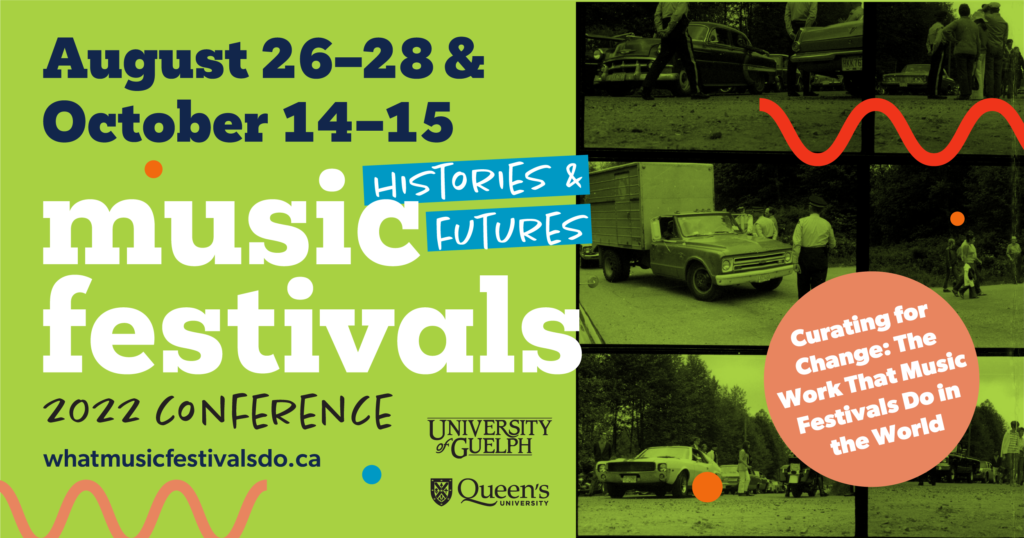Curating for Change Conference Round-Up
CURATING FOR CHANGE: THE WORK THAT MUSIC FESTIVALS DO IN THE WORLD
CONFERENCE ROUND-UP
Curating for Change was a two-part online conference on music festivals as resonant—even if at times contested—sites of activism, equity, environmental stewardship, and community-building. Over 5 days in August and October, this conference brought together more than 220 registrants, including scholars, practitioners, artists, organizers, festivalgoers, and patrons in the realm of music-making, who were able to reflect on the work that independent, artist-run, or boutique music festivals do in promoting vital forms of activist arts-based practices and pedagogies.
Curating for Change was an inspiring event. With a schedule that included a wide array of activities, including keynote addresses, panels, discussions, film screenings, workshops, interviews, and a podcast launch, this conference touched upon a wide range of pressing topics relating to music festivals, including equity and representation, political activism, funding, archiving, and environmental sustainability. Over 35 presenters from around the globe invited attendees to consider historical and contemporary perspectives on the ways in which festivals shape our world, reflect our cultural values, perpetuate or challenge social norms, and—at the best of times—provide spaces to dream up and put into practice more thoughtful, joyful, and inclusive ways of being.
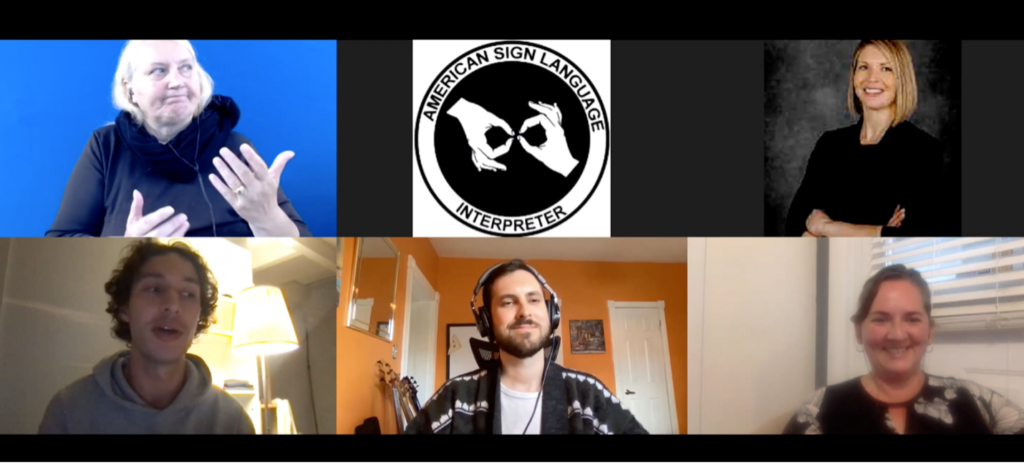
A screenshot from the panel “Enacting Local Forms of Sustainability” on November 15th. From left to right: (top row) ASL interpreter Ava Hawkins; (bottom row) Lucas Zarzoso (DGTL Doughnut Festival, Netherlands), Ben Finley (Westben Centre, Critical Studies in Improvisation doctoral student, panel chair), and Alicia Marván (Guapamacátaro Art & Ecology Centre, Mexico).
While we would have loved to experience this conference in person, hosting the full conference remotely (via Zoom) allowed for greater attendance from around the world; a live transcription option for attendees; a safe and inclusive environment; and significantly reduced environmental impact (a topic extensively discussed in relation to festivals during the conference). To make the event as accessible as possible, we also offered ASL interpretation for the entirety of part 2 of the conference, as well as retrospective ASL interpretation for recordings of select presentations during part 1. Thank you to our interpreters, Denika Philpott, Heather Crane, and Ava Hawkins!
Curating for Change: The Work That Music Festivals Do in the World was organized by Eric Fillion and Ajay Heble, and was put on by IICSI at the University of Guelph and the Department of History at Queen’s University. Thanks to our sponsors and partners: the Social Sciences and Humanities Research Council of Canada, The Bookshelf, CFRC 101.9, CFRU 93.3, and Tenzier; as well as the Canada India Research Centre for Learning and Engagement (CIRCLE), the College of Arts, the School of English and Theatre Studies (SETS), and the Department of Sociology and Anthropology (SOAN) at the University of Guelph; and the Dan School of Drama and Music, the Department of History (Bernice Nugent Fund), the Faculty of Arts and Science, and Jewish Studies at Queen’s University. Thank you to the conference organizing team for making this event possible: collaborators Ben Finley and Melissa Noventa as well as Sam Boer, Bronwyn Jaques, Sheetal Lodhia, Marie Zimmerman, and Lucy Bilson. You can learn more about the conference organizing team at our website.
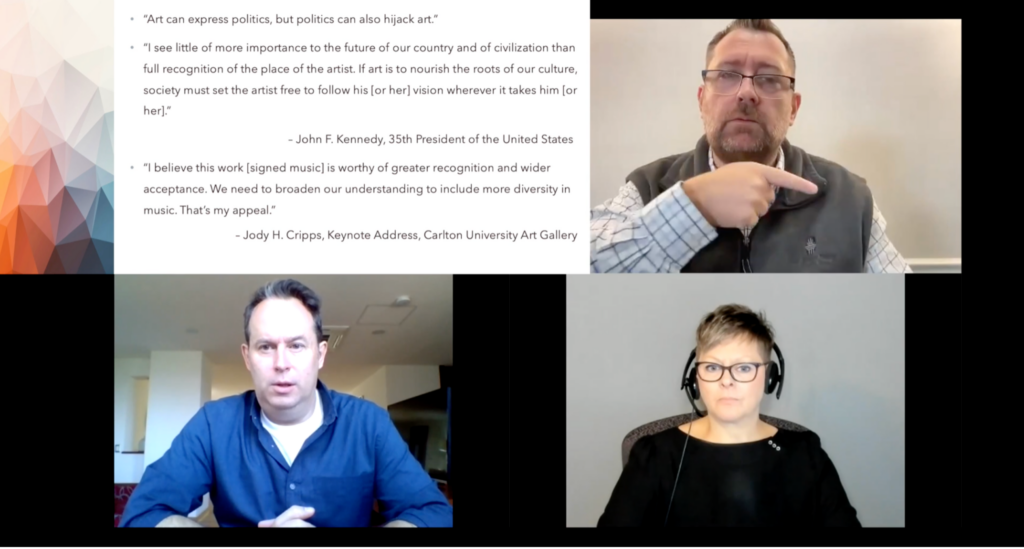
A screenshot from “Jody Cripps and Chris Dodd: In Conversation” on November 15th. Clockwise, from top right: Jody Cripps (Clemson University), ASL interpreter Denika Philpott, and Chris Dodd (Sound Off Festival).
We invite you to visit the Curating for Change conference website, which features recordings of several conference proceedings (with ASL interpretation), as well as an impressive array of conference-related content, including:
- The “CFRC 101.9 FM Series” by conference organizer Eric Fillion, featuring interviews related to the conference with an array of fantastic guests
- Recordings of past conference panels with ASL interpretation
- Creative responses to conference proceedings from scholars
- Introductions to films screened during the conference: George Lipsitz on Soul Power (2008) and Clarke Mackay on Festival Express (2003)
- Guelph Jazz Festival – Rogers TV Documentary (originally aired 2013)
HIGHLIGHTS FROM THE CONFERENCE
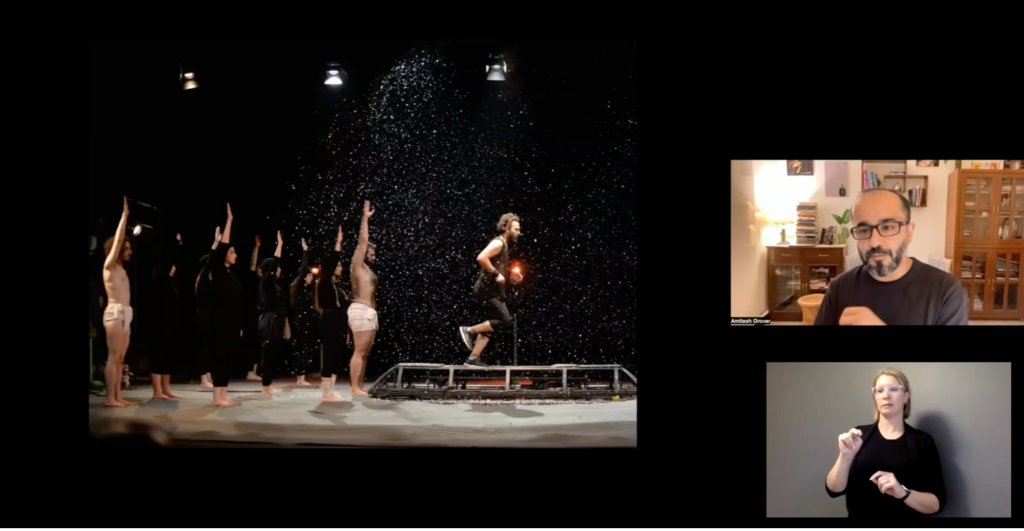
A screenshot from “There Will Be Trouble: A Reflection on Curating for Change” by Amitesh Grover (National School of Drama, India). Top right: Amitesh Grover. Bottom Right: Heather Crane. Left: A photographic from a dramatic performance at the International Theatre Festival of Kerala (2020).
Day 1 of the conference (August 26) was a full day of engaging presentations and panels, starting with Amitesh Grover’s address “There Will Be Trouble: A Reflection on Curating for Change” in which he used his curation of the International Theatre Festival of Kerala (2020) to discuss the possibilities and challenges of a program that critiqued mainstream ideas on citizenship and patriotism, nationhood and freedom, migration and human rights. Speaking to the potentialities of festivals, Grover explained how this festival “became a site to look closely at emerging modes of performance that genuinely carry a radical edge, and thus open new avenues for performing culture and social politics in and around theatre. It offered protection, attention, and amplification to voices, identities, and silences that are under threat in India today.” A full recording of this talk, with ASL interpretation, is available on the festival website.
Panels on this first day included “Placemaking Between the Local and the Global” (Jonathan Wynn and Marie Zimmerman), “Staging Difference and Diversity” (Hannah Burgé Luviano, Kristin Moriah, and Marva Wisdom), and “Experimentalism, Transformation, and Festival Culture” (Peter Burton and Chris Worden), featuring scholars and practitioners from Canada and the US. A workshop on “Dance, Music, and Festivals” by Charmaine Headley (COBA, Collective of Black Artists) and Kevin Ormsby (KasheDance & Cultural Pluralism in the Arts Movement Ontario) got folks moving while considering how dance / movement instruction can function as a gateway to unpacking the embodied legacy of identity and solidarity in the diaspora.
A conversation between Michel Levasseur (Festival International de Musique Actuelle de Victoriaville) and Ajay Heble (Founder, Guelph Jazz Festival) saw these two veteran festival organizers sharing their knowledge (video recording available here), while a conversation between Alan Greyeyes (Sākihiwē Festival) and Candice Hopkins (Forge Project) provided insights into the state of Indigenous arts in North America, touching upon topics including retrograde and colonial grant funding models, networks of support for Indigenous artists/presenters, and Festivals’ relationships to the lands on which they take place (listen to the recording of their conversation here).
Ending off the day was a keynote address from legendary jazz bassist William Parker and renowned festival organizer and dancer Patricia Nicholson (Vision Fest / Arts for Art, USA), which also marked the start of IF 2022 (a 24-hour festival of improvised arts hosted by IICSI). Their address, titled “The Creative Response: Art and Resistance,” provided a range of reflections upon their intertwined careers in arts organizing, performance, and political activism. You can watch the recording on our website.
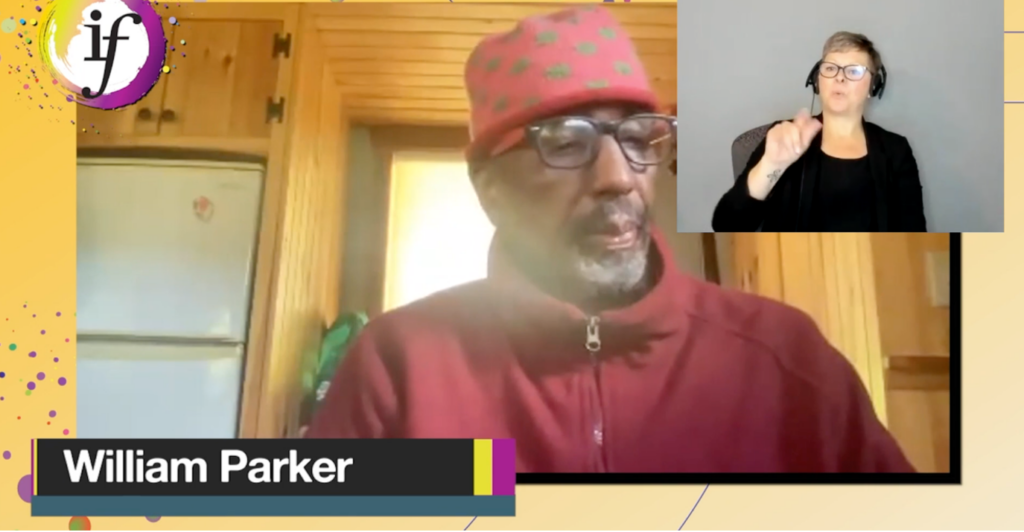
A Screenshot from the keynote address “The Creative Response: Art and Resistance by William Parker and Patricia Nicholson. The larger screen features William Parker, while the smaller screen features ASL interpreter Denika Philpott.
The following two days of the conference (August 27 & 28) featured free in-person film screenings at local Guelph theatre The Bookshelf. Spectators, including conference attendees and members of the public alike, joined us for special screenings of: Festival Express (2003)—a film documenting the 1970 cross-country tour of The Grateful Dead, Janis Joplin, The Band, Buddy Guy, and others—with an introduction by Clarke Mackey (one of four cinematographers on the 1970 concert tour!); and Soul Power (2008)—a documentary film about the Zaire 74 soul music festival in Kinshasa, which accompanied the Rumble in the Jungle heavyweight boxing championship match between Muhammad Ali and George Foreman—with an introduction by George Lipsitz (Emeritus Professor of Black Studies and Sociology at the University of California, Santa Barbara).
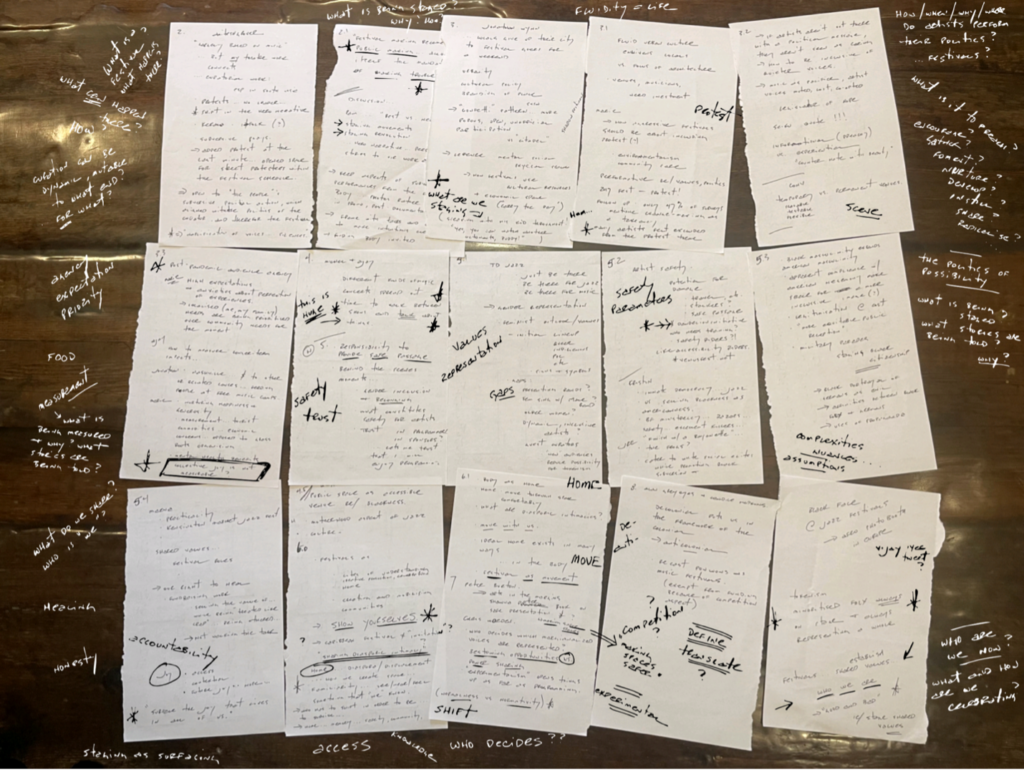
Notes on Part 1 of Curating for Change by Joe Sorbara (University of Guelph, Critical Studies in Improvisation doctoral student).
Part 2 of the conference, on October 14-15, began with a keynote conversation between acclaimed music writer Simon Frith and popular music scholar Jo Haynes (listen here), featured a “Histories and Futures” panel—which touched on Christian hardcore music festivals, the evolutions of Newport and Coachella, and the ‘Red Woodstock’ of East Germany (with Andrew Mall, Steve Waksman, and Katharine White)—and ended with a presentation by Michael Kramer (State University of New York-Brokport) on archives and digital history titled “Mance Lipscomb’s Silhouette: Region, Race, Expertise, and Digitization at the Berkeley Folk Music Festival Project” (watch in full here).
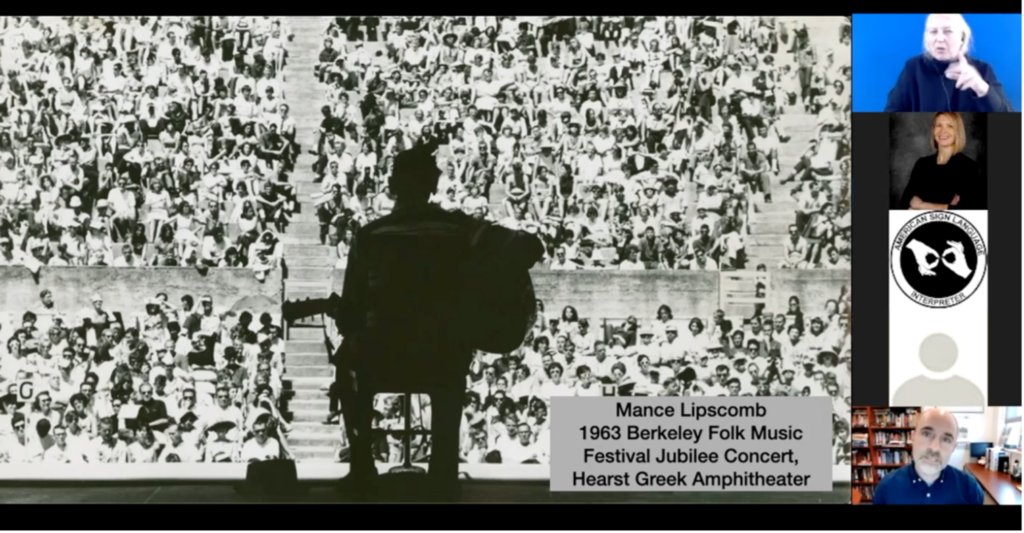
A Screenshot from “Mance Lipscomb’s Silhouette: Region, Race, Expertise, and Digitization at the Berkeley Folk Music Festival Project,” a presentation by Michael Kramer. The larger screen features an image of Mance Lipscomb, in silhouette, in front of a large outdoor crowd. Smaller screens to the right side feature ASL interpreter Ava Hawkins and Michael Kramer.
The final day of the conference was packed with panels and presentations, starting with a dialogue between Jody Cripps (Clemson University) and Chris Dodd (SOUND OFF Festival) that touched upon the history of deaf performance in Canada, current trends in North America and Europe, and ideas for building a vibrant future for deaf artists and audiences (full recording available here). A panel on “Festivals as Community-Making” explored questions of well-being, religion, and aesthetics at festivals (with Chanel Prince, Jessica Roda, Sofia Doroshenko, and Cheryl Thompson). Before breaking for lunch, we held a special podcast launch talk by researcher Melissa Noventa on her episode “‘The Cubans are Coming!’: ¡Afrocubanismo! and the ‘Artistic Coup’ of Banff” of the Cuban Serenade podcast; after lunch was a screening of Jason Wilson’s film Book of Rules: One Reggae Anthem and Its Trouble with ‘Tradition.’
Rounding out the conference were two sessions on the topic of festivals and sustainability: a presentation on Creative Green Tools Canada by Ian Garret (Director of the Centre for Sustainable Practice in the Arts) and Devon Hardy (Program Director, Creative Green Tools Canada) and a panel on “Enacting Local Forms of Sustainability” that brought together Lucas Zarzoso (DGTL Doughnut Festival, Netherlands), Alicia Marván (Guapamacátaro Art & Ecology Centre, Mexico), and moderator Ben Finley (Westben Centre, Critical Studies in Improvisation doctoral student). You can watch the full recording of the latter on our website.
The conference concluded by bringing together members of the organizing team to reflect and to riff on some of the key issues opened up by our two-part event. As we think about histories and futures, and as we ponder (and learn from) the longer-term impacts brought about by music festivals, we can’t but help think about the current moment in which find ourselves. What form might curation take as we move into a post-pandemic landscape, and how best can we find ways to enact some of the possibilities that we’ve only just begun to envision?
WHAT’S NEXT?
The conference website is a living site, to which more and more content has been added since part 2 of Curating for Change concluded in October. This resource will continue to be updated going forward, and we will post news there about ongoing and future works emerging from this conference, so please stay tuned!
Be sure to follow IICSI on social media (Facebook, Instagram, Twitter) and/or subscribe to our monthly newsletter for ongoing updates about research activities, including future conferences.
Please email us at [email protected] to provide feedback on the conference or ask any questions you may have. We’d love to hear from you!

